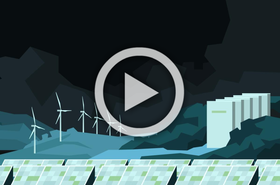"Our new net-zero strategy will help my company become insanely wealthy... and save the planet!" a software company's head of sustainability once joked to me.
He was telling me that science-based emissions targets make good moral and economic sense. Saving energy, and saving emissions, often means saving money, and they also reduce your burden on the world. That's not quite saving the planet, but at least it's not doing any harm.
My friend wouldn't let me quote him by name. But his words came back to me this week when I prepared for a webinar that is part of our Earth Day content.
PPAs are a useful hedge
The panel is about clean energy financing - and you can hear it today at 3pm UK time, or on demand. We'll cover renewable energy credits (RECs), power purchase agreements (PPAs), and a brief discussion of offsets - those schemes where you pay conscience money into an environmental scheme, such as not cutting down trees.
RECs and PPAs are ways to pay money for renewable energy generation - even if there's no renewable energy available to you on your local grid. You need to buy energy locally where you can use it, even if those electrons are "brown." But you can pay money to buy the REC associated with some green electrons elsewhere. That's an unbundled REC (that's the US name for them, by the way, if you buy a REC in Europe, it's called a Guarantee of Origin).
PPAs are when you make a bulk purchase of energy. often by funding a new solar plant or wind farm, and often locally to your grid. You are still most likely not getting the green electrons from that renewable energy source, but you have paid to have them put on the grid.
They aren't a complete alternative to RECs. In fact, PPAs include RECs, but the RECs are bundled with the energy.
Cloud providers like Google AWS and Microsoft are the world's largest buyers of PPAs, spending millions to have GWh of renewable energy put onto the grid. But it's not just an altruistic gesture, one of my co-panelists told me.
Buying a PPA can be a hedge against changes in the price of energy. Companies that bought PPAs in recent years will have paid a price that has been agreed up-front, and must now be getting their energy at a considerable discount from the market price, which has been boosted by the energy crisis brought on by the Ukraine war.
That saving might not make them insanely wealthy, but it should soothe their CFO's stresses.
But RECs can save the world
The surprising part is how useful RECs can be. Unbundled RECs were very popular in the 2010s, which were the early days of organizations' net-zero ambitions, but have recently got a bad name. Utilities with renewable energy would sell the RECs associated with that energy on the open market, and an operator could simply buy enough to cover their consumption on paper.
As not many organizations were concerned about reaching net-zero, the market price for unbundled RECs was small (sometimes as low as $1 per MWh) and those early RECs were often associated with existing capacity such as hydroelectric dams, whose capital costs had been paid off years ago.
For this reason, unbundled RECs have been labeled as "greenwash," and I wrote recently that it is time to move on from them. That piece brought me a strong and interesting argument from Equinix, in favor of using unbundled RECs where no other green finance option is available. There are many countries where energy is not deregulated, and there is simply no option to buy PPAs or invest directly in renewable energy sources, In those cases, it's better to do something than nothing, and stimulate demand, says Equinix's Bruce Frandsen.
But there is more that RECs can do. They aren't necessarily tied to where the energy is actually used, so why not look at where clean energy is most desperately needed?
That's what the distributed REC or D-REC does.
There's a world shortage of clean power, with 750 million people lacking basic electricity, says The World Bank. Two billion more have shaky grid connections from sources like local diesel generators, which don't provide good power and spew emissions.
PPAs are big projects focusing money on already-reliable grids in the rich world, so the D-REC group, led by PowerTrust, had the idea of using a distributed system to aggregate beneficial developing world projects to create funding opportunities that fit the demands of big cloud players.
Schemes to replace diesel generators with solar or wind power are very good environmentally, but hard to fund. They need capital for the plant, and they need batteries to match the input to the demands. D-RECs can bring in that capital, says PowerTrust's Ricky Buch, and get projects going that would otherwise never have happened.
Once again, they are a solid investment - and they provide clean power to those who need it. It may not make the companies involved insanely rich, but it doesn't hurt their finances. And it still leaves us with quite a lot more to do in terms of actually saving the world.
But let's hope we have a few more good ideas to make that happen.


